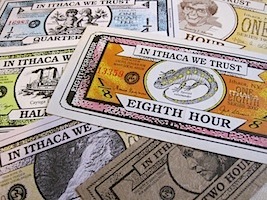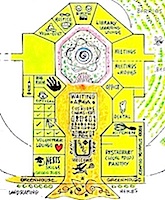




 |
 |
 |
 |
 |
| PAUL GLOVER ESSAYS: community
control of food, fuel, housing, health care,
planning, education, finance. |
| HOME | INTRO | CURRENCY | SUCCESSES | HOW-TO BOOK | PUBLICITY | ESSAYS |
|
Why the United States
Will Lose this War September 24, 2001 by Paul Glover New York City and the Yankees deserve to win, for the sake of justice. Our flag and our people and music are beautiful and sexy-- we deserve to win. And our military is the most powerful sonofabitch on the planet. But the United States will lose this war and spoil everybody's fun, and here's why. Thanks to movies and books everyone remembers Pearl Harbor-- how we were jumped by Japs and how our righteous anger became ruthless military force, and we beat half the world. That was America 60 years ago. That America was lean and rich. Today the United States is profoundly weak within. We've used up most domestic natural resources and have built tall brittle cities ready to collapse without being attacked by foreign psychos. Today making global war is like screaming at your dog while the house burns. The problem is simple-- while fighting a major war abroad you've got to keep the home front alive too, right? Can't be done in 2001. The United States will lose this war because, among other things, during the past sixty years we've burned 80% of our original domestic oil reserves and now depend on tankers from abroad. Nearly all our strategic industrial metals are imported. Sixty years ago most Americans lived in comparatively energy-efficient cities connected by railways. Today nearly half our population are suburbanites helpless without their cars. Home heating has overshot regional supplies (coal, hydro, wind) to rely on a continental grid that's already stretched to the breaking point. Today the average house is bigger, with five times more light bulbs and many more appliances. Pumping domestic water has become a huge fuel load. Speaking of water, it's pretty necessary for growing food, which soldiers and their families will demand. Feed my family or I won't fight. Sixty years ago plentiful groundwater made drought more regional and remediable. Today the Midwest breadbasket, with far greater population, has significantly emptied the Oglalla aquifer, and rainfall patterns are generally more unreliable. Sixty years ago, despite Dust Bowl drought, topsoil nationally was generally deeper. Since then it's been scraped and scalded by massive combines and poisons. And while there are now twice as many hungry American mouths, there remains a fraction of our former arable land per capita. Worse, remember that back in 1941 most Americans knew how to grow and preserve food and most had access to garden space. They even knew how to hunt food, and there was plenty to shoot at. Endless forests teemed with wildlife. Today just 70% of forest cover and a trace of wetlands remain. |
During
the Big War, Americans were neighbors. City or
farm, they knew the people around them. They relied on each other for
child care and housework when sick or mourning. Family doctors even
visited homes, for small fees. Today these informal safety networks
have been vastly dissolved, while government has been dismantling
official nets. When everyone was poor, people pulled together. Today
unequal scarcity is likelier to inspire robbery, drug sales and rioting. Sixty years ago, Americans knew how to make stuff and repair it. There was a manufacturing and labor base ready for war or peace. Today, Americans likelier know how to sell gifts and process data. Shoes come from Asia. We even had real money in 1941, backed by hard silver and hard goods. Dollars today are backed by speculation, rusting industry and $5.5 trillion national debt. Sixty years ago, farmers and small businesses could get reasonable credit from bankers they knew well. Today money moves mechanically from small towns to big cities, and from there overseas. Sixty years ago, most workers did essential work and saved money for real needs. Today we're a frantic consumer economy, earning pretend money principally doing pretend jobs to meet pretend needs. Now the bad news. America is more militarily vulnerable than ever. Our 103 nuclear power plants are giant landmines each capable of killing millions when punched by a commuter jet. Cities like Los Angeles can be clobbered more completely than was New York, by blasting certain freeway intersections. Slam the right electric substations with crowbars to shut down power grids for months. Explode reservoirs to sink cities. Enemies don't need armies or missiles any more. And face it, when enough people hate America enough, putting the National Guard on every street corner is not going to prevent every attempt to spray schoolyards with machine guns. There will never be enough video cameras and bomb-sniffing dogs to catch every container of poison gas or anthrax thrown into subways or churches. Terror? We ain't seen nothing yet. Finally, we'll lose this war because an article like this will be unpleasant to read and thus will be dismissed as unpatriotic. Rather than make difficult changes, it's easier to censor people in the name of national security. Some un-Americans would require us to follow the wartime dictates of authorities who are oil executives rather than statesmen. When that happens we're really screwed, because a public scared of speaking out will be a public scared of speaking at all. And a silent nation, timid as elevator riders, will be even easier to infiltrate and attack. Maybe that's what some prefer-- realizing that permanent war justifies permanent unquestioned dominance by military and industrial interests. An empire can do a lot of damage as it flails deeper into quicksand. Wrapping ourselves in flags does not pull us free. Rather, to win this war we'll have to rebuild our cities, consolidate suburbs into villages, superinsulate and re-tool our housing, revive regional agriculture, decentralize enterprise and finance, revive rail, plug in the wind and sun, establish nonprofit safety nets, and get more excited about creating than consuming. And when we've done so, we'll have built an America fundamentally independent of foreign resources. When that is accomplished, we'll have broken the spiral of oppression and hatred abroad, to welcome visitors who will respect us and be happy to return home. We won't need war. We'll provide a grand and decent future for our kids. |
| HOME | INTRO | CURRENCY | SUCCESSES | HOW-TO BOOK | PUBLICITY | ESSAYS |
 |